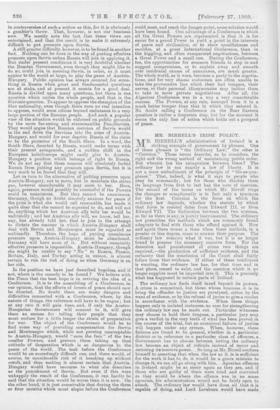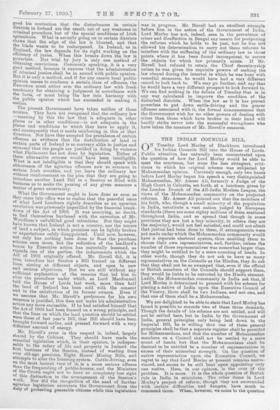MR. BIRRELL'S IRISH POLICY. -14 R. BIRRELL'S administration of Ireland is
a striking example of government by phrases. One of these phrases is "the Ordinary Law," the other is " Coercion. ' These terms describe, as he considers, the right and the wrong method of maintaining public order. But wherein lies the antagonism between them? The. ordinary law is not exactly a law of liberty. It is not a mere embodiment of the principle of "Go-as-you- please." That, indeed, is what it says to people who obey its commands ; but for those who disobey them its language from first to last has the note of coercion. The second of the terms on which Mr. Birrdl rings the changes so complacently is in fact only a synonym for the first. Coercion is the force on which the ordinary law depends, whether the statute by which that force is created dates from Edward III. or fforn Edward VII. The distinction between the two systems, so far as there is any, is purely instrumental. The ordinary law prescribes the methods which are commonly found adequate to deal with those Who offend against it. Now and again there comes a time when these methods, in a greater or less degree, cease to answer their purpose. The ordinary law remains what it was, but it is no longer found to possess the necessary coercive force. For the detection and punishment of crime two things are required,—the production of sufficient evidence, and the certainty that the conclusion of the Court shall fairly follow froth that evidence. If either of these conditions is wanting, the ordinary law has, for that time and in that place, ceased to exist, and the coercion which it no longer supplies must be imported into it. This is precisely what has happened in certain parts of Ireland.
The ordinary law finds itself taxed beyond its powers. A crime is committed, but those whose business it is to bring the offender to justice are paralysed, either by the want of evidence, or by the refusal of juries to give a verdict in accordance with the evidence. When these things happen only in isolated instances, no case for strengthening the ordinary law can be made out, Particular witnesses may choose to hold their tongues, a particular jury may give a verdict in the very teeth of what has been proved in the course of the trial, but an occasional failure of justice will happen under any system. When, however, these failures are found to be general, whether in a particular district or in reference to a particular class of offences, a Government has to choose between letting the ordinary law become an object of ridicule instead of terror and restoring its coercive power. So long as Mr. Birrell confines himself to asserting that when the law as it is is sufficient for the work it has to do it would be a grave mistake to change it, we can all go along with him. Agrarian offences in Ireland might be as many again as they are, and if those who are guilty of them were tried and convicted as they would be where the offence was in no sense a,grarian, his administration would not be fairly open to attack. The ordinary law would have done all that it is eapable of doing, and Lord Loreburn would have made good his contention that the disturbances in certain districts in Ireland are the result, not of any weakness in criminal procedure, but of the special conditions of Irish agriculture. What is actually going on in certain districts shows that the edge of the law is blunted, and that the blade wants to be resharpened. In Ireland, as in England, the law depends for its right working on the efficiency of juries. When this breaks down the law is Powerless. But trial by jury is only one method of obtaining convictions. Commonly speaking, it is a very good method, because it ensures that the administration of criminal justice shall be in accord with public opinion. But it is only a method, and if for any reason local public Opinion ceases to condemn a certain class of offences, the Executive must either arm the ordinary law with fresh machinery for obtaining a judgment in accordance with the facts, or must bring the law into harmony with the public opinion which has succeeded in making it useless.
The present Government have taken neither of these courses. They have not recognised that the ordinary law —meaning by this the law that is adequate in other Places or in other conditions—is not adequate in the places and conditions to which they have to apply it, and consequently that it needs reinforcing in this or that direction. Not have they accepted the prevalence of certain offences as evidence that the distribution of land in certain parts of Ireland is so contrary alike to justice and economy that the people are justified in doing by violence what Parliament has not done by legislation. Either of these alternative courses would have been intelligible. What is not intelligible is that they should speak with abhorrence of the agrarian offences now so common in certain Irish counties, and yet leave the ordinary law 'Without reinforcement on the plea that they are going to introduce another Land Bill in a Session so filled with business as to make the passing of any given measure a matter of great uncertainty.
What the Government ought to have done as soon as they came into office was to realise that the peaceful issue of what Lord Loreburn rightly describes as an agrarian revolution was grievously imperilled by the financial break- down of the Act of 1903. It was annoying, no doubt, to find themselves burdened with the execution of Mr. Wyndham's unfulfilled good intentions. But they might have known that Ireland is not a country, nor the tenure of laud a subject, in which promises can be lightly broken or expectations safely disappointed. Until now, however, not only has nothing been done to float the purchase scheme once more, but the reduction of the landlord's bonus by Executive action has materially lessened, as regards one of the parties, the inducements which the Act of 1903 originally offered. Mr. Birrell did, it is true, introduce last Session a Bill framed on different lines, aiming at different objects, and open to new and serious objections. But we are still without any sufficient explanation of the reasons that led him to alter the procedure under which, as Lord Macdonnell told the House of Lords last week, more than half the land of Ireland has been sold with the consent and to the satisfaction of its former owners. Even if we assume that Mr. Birrell's preference for his own measure is justified, this does not make his administrative action any more excusable. If he had satisfied himself that the Act of 1903 bad been framed on a wrong principle, and that the lines on which the land question should be settled were those of last year's Bill, that Bill should have been brought forward earlier, and pressed forward with a, very different amount of energy. Mr. Birrell's error in this respect is, indeed, largely shared by the Cabinet. They should have made the remedial legislation which, in their opinion, is indispen- sable to the safety of life and. property in Ireland the first business of the Session, instead of wasting time over old-age pensions, Eight Hours' Mining Bills, and attempts to alter the licensing system. Cattle-driving, even on the most lenient view of it, is a more serious offence than the frequenting of public-houses, and the Ministers of the Crown ought not to have so completely lost sight of this distinction in the arrangement of the Session's work. Nor did the recognition of the need of further agrarian legislation exonerate the Government from the duty of protecting peaceable citizens while this legislation was in progress. Mr. Birrell had an excellent example before him in the action of the Government of India. Lord Morley has not, indeed, seen. in the prevalence of crime and disaffection in Bengal any reason for postponing the reforms which he holds to be just, but he has not allowed his determination to carry out these reforms to interfere with the stiffening of the ordinary law in those points where it has been found incompetent to secure .the objects for which law primarily exists. If Mr. Birrell had refused to retain the Chief Secretaryship unless he was given the requisite powers of making the Jaw obeyed during the interval in which he was busy with remedial measures, he would have had a very different record to look back to. We may go further, and say that he would have a very different prospect to look forward to. We can find nothing in the debate of Tuesday that is in any way calculated to improve the condition of the disturbed districts. When the law as it is has proved powerless to put down cattle-driving and the graver offences associated with it, the formal announcement that the Government wish for no other powers of dealing with crime than those which have broken in their hand will hardly strike terror into the successful wrongdoers who have taken the measure of Mr. Birrell's censures.







































 Previous page
Previous page